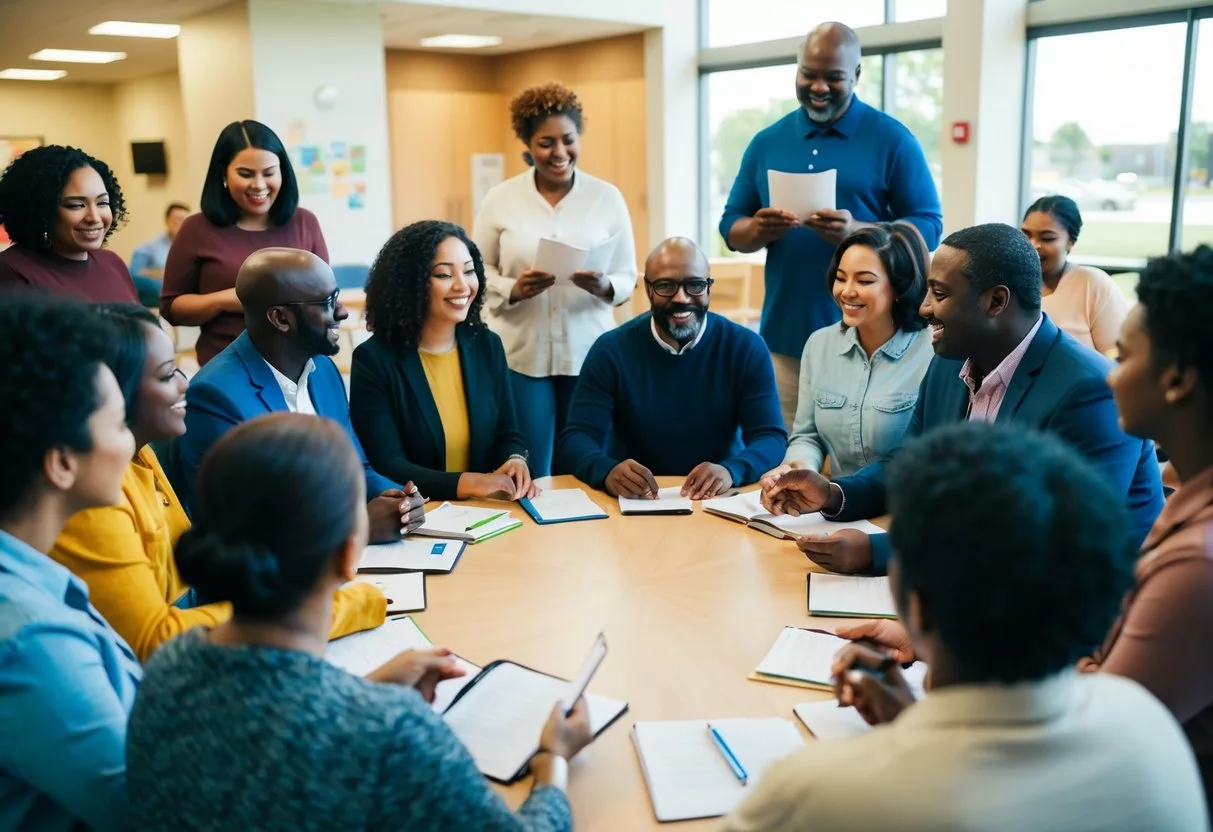Addiction recovery is a journey that many people face. It’s a process of breaking free from substance abuse and building a healthier life.
Recovery takes time, effort, and support.

People can overcome addiction with the right help and tools. Residential rehab programs offer intensive treatment for those struggling with substance use.
These programs give people a chance to focus fully on getting better.
There are also other options for recovery. Outpatient treatment lets people get help while still living at home.
Support groups like SMART Recovery offer peer support and coping skills. With professional help and commitment, lasting recovery is possible.
Understanding Addiction

Addiction is a complex condition that affects brain function and behavior. It involves compulsive substance use despite negative consequences. Many factors contribute to the development of addiction.
Defining Substance Use Disorder
Substance use disorder is a medical condition marked by the inability to control drug or alcohol use. It changes how the brain works and affects a person’s daily life.
The disorder ranges from mild to severe.
People with this condition may have trouble at work, school, or home. They might keep using drugs even when it causes problems. Physical dependence often occurs, leading to withdrawal symptoms when stopping use.
Substance use disorders can involve many different drugs. These include alcohol, opioids, and stimulants. Treatment options vary based on the specific substance and severity of the disorder.
Stages of Addiction
Addiction typically develops in stages. It starts with initial use and can progress to dependence. Understanding these stages helps in early intervention and treatment.
- Experimentation: First-time use, often driven by curiosity
- Regular use: More frequent substance use, often in social settings
- Risky use: Increasing amounts and frequency, despite negative effects
- Dependence: Physical and psychological reliance on the substance
- Addiction: Compulsive use despite severe consequences
The stages of change model is used in addiction treatment. It includes pre-contemplation, contemplation, preparation, action, and maintenance.
Each stage requires different approaches to support recovery.
Recognizing these stages can help individuals and their loved ones seek help early. Early intervention often leads to better outcomes in addiction treatment.
The Recovery Process

The recovery process involves distinct phases that people go through as they overcome addiction. It starts with early recovery and moves into a long-term maintenance phase. Each stage has unique challenges and goals.
Early Recovery
Early recovery is the first step in overcoming addiction. It typically lasts 3-6 months. During this time, people focus on staying sober and learning new coping skills.
Detox is often the first part of early recovery. It lets the body rid itself of drugs or alcohol. This can be uncomfortable and may require medical help.
After detox, therapy begins. People learn about addiction and its effects. They identify triggers that led to substance use. New ways to deal with stress and emotions are practiced.
Support groups like Alcoholics Anonymous play a big role. They provide community and guidance from others in recovery.
Maintenance Phase
The maintenance phase follows early recovery. It can last months or years. The goal is to stay sober long-term and build a healthy life.
People in this phase work to prevent relapse. They use the skills learned in early recovery. Triggers are managed better. Healthy habits become routine.
Ongoing therapy helps address deeper issues. Family relationships may be rebuilt. Career and education goals are often pursued.
Self-care becomes a priority. Exercise, good nutrition, and sleep are important. Hobbies and interests are developed to replace substance use.
Support groups remain helpful. Some people become mentors to those new in recovery. This reinforces their own commitment to sobriety.
Treatment Modalities

Addiction recovery uses different approaches to help people overcome substance use disorders. These methods aim to change behaviors and manage cravings. Some focus on therapy, while others use medications to support the process.
Behavioral Therapies
Behavioral therapies are a key part of addiction treatment. They help people change how they think and act about drugs or alcohol.
Cognitive-behavioral therapy (CBT) is a common type. It teaches skills to avoid drug use and handle stress.
Group therapy lets people share experiences and support each other. Family therapy works on relationships damaged by addiction. It helps loved ones understand and assist in recovery.
Motivational interviewing is another useful method. It helps people find their own reasons to quit using drugs. This can make them more likely to stick with treatment.
Medication-Assisted Treatment
Medication-assisted treatment (MAT) uses drugs to help manage addiction. It’s often used with therapy for best results.
MAT can reduce cravings and block the effects of drugs.
For opioid addiction, medicines like methadone and buprenorphine are common. They help prevent withdrawal and reduce drug use. Naltrexone is another option that blocks opioid effects.
Alcohol addiction also has medication options. Disulfiram makes people feel sick if they drink. Acamprosate helps reduce cravings. Naltrexone can be used for alcohol too.
MAT is safe when used as directed. It can help people stay in treatment longer and avoid relapse.
Support Systems

Strong support systems play a crucial role in addiction recovery. They provide encouragement, accountability, and practical help during challenging times.
Effective support comes from various sources and involves different types of relationships.
Community and Peer Support
Recovery support groups offer valuable assistance to those overcoming addiction. These include 12-step programs and other peer-led groups. Participants share experiences and offer mutual support.
Online forums and virtual meetings expand access to peer support. They allow people to connect anytime, anywhere. Many find comfort in talking to others who truly understand their struggles.
Treatment programs often include group therapy sessions. These foster connections between people at similar stages of recovery. Shared goals and challenges create a sense of community.
Sober living homes provide a supportive environment for those in early recovery. Residents encourage each other’s sobriety and share daily responsibilities.
Family Involvement
Family support is vital for many in recovery. Open communication helps rebuild trust and strengthen relationships damaged by addiction.
Family therapy sessions can be beneficial. They address underlying issues and teach healthy communication skills. Families learn how to support their loved one without enabling harmful behaviors.
Education about addiction helps family members understand the recovery process. This knowledge allows them to provide more effective support. It also reduces stigma and promotes empathy.
Setting clear boundaries is important. Family members learn to support recovery while maintaining their own well-being. This balance creates a healthier home environment for everyone involved.
Relapse Prevention

Relapse prevention is a key part of addiction recovery. It helps people stay sober by dealing with cravings and risky situations.
Learning about triggers and building coping skills are two main parts of stopping relapse.
Understanding Triggers
Triggers are things that make someone want to use drugs or alcohol again. They can be:
• People or places linked to past drug use
• Feeling stressed, angry, or sad
• Being around others who are using
• Certain times of day or events
Knowing your triggers is the first step. Keep a log of when you feel urges to use. This helps spot patterns.
Psychological and environmental factors often lead to relapse. Being aware of these can help avoid high-risk situations.
Developing Coping Strategies
Coping strategies help manage cravings and avoid relapse. Some useful techniques are:
- Distraction – Do an activity you enjoy when cravings hit
- Relaxation – Try deep breathing or meditation to calm down
- Positive self-talk – Remind yourself why you chose recovery
- Calling a support person – Reach out to a sponsor or counselor
Practicing self-care is also key. Eat healthy foods, exercise, and get enough sleep.
Join a support group to connect with others in recovery. Having a daily routine with healthy habits builds a strong base for staying sober.
Mental and Emotional Well-being

Caring for mental health and building resilience are key parts of addiction recovery. These factors help people cope with stress and stay on track in their journey to wellness.
Role of Mental Health
Mental health plays a big role in addiction recovery. People with good emotional wellness can better handle life’s ups and downs. They know how to deal with their feelings in healthy ways.
Taking care of mental health means getting help when needed. This could be talking to a therapist or joining a support group.
It also means learning new skills to manage stress and anxiety.
Some ways to boost mental health include:
• Regular exercise
• Healthy eating
• Getting enough sleep
• Practicing mindfulness
These habits help the brain and body work better. They can lift mood and lower the risk of relapse.
Building Resilience
Resilience is the ability to bounce back from hard times. It’s a key skill for people in recovery.
Building resilience helps people stay strong when faced with triggers or setbacks.
Ways to build resilience include:
• Setting realistic goals
• Learning from past mistakes
• Developing a support network
• Practicing self-care
Having hope is also part of resilience. It means believing that things can get better. Hope gives people the strength to keep trying, even when recovery feels hard.
Self-care is another important part of building resilience. This means taking time to do things that bring joy and relaxation.
It could be reading a book, taking a walk, or spending time with loved ones.
Lifestyle and Behavioral Changes

Changing your lifestyle and habits plays a key role in addiction recovery. It helps build a new, healthier identity and gives a sense of purpose.
These changes can boost self-efficacy and support long-term sobriety.
Importance of Self-Care
Self-care is vital for addiction recovery. It involves taking care of physical and mental health. This can include getting enough sleep, eating well, and managing stress.
Regular exercise is a powerful self-care tool. It improves mood and reduces cravings.
Even a short daily walk can make a big difference.
Mindfulness and relaxation techniques are helpful. They can lower stress and improve focus.
These may include deep breathing, yoga, or meditation.
Seeking support is also part of self-care. This could mean talking to a therapist or joining a support group.
Connecting with others who understand can be comforting and motivating.
Adopting Healthy Habits
Creating new, positive habits is crucial for lasting recovery. Start by setting small, achievable goals.
This builds confidence and momentum.
Developing a routine can provide structure and stability. This might include:
- Regular mealtimes
- A consistent sleep schedule
- Daily exercise
- Time for hobbies or relaxation
Positive lifestyle changes can reduce the risk of relapse. They also improve overall health.
Some beneficial habits to consider:
- Eating a balanced diet
- Staying hydrated
- Avoiding triggers
- Practicing good hygiene
- Engaging in creative activities
Building healthy relationships is important too. Surround yourself with supportive people who respect your recovery journey.
The Role of Community

Community plays a vital part in addiction recovery. It provides support, understanding, and shared experiences that can make a big difference.
Recovery Community Networks
Recovery community networks bring people together who are on similar paths. These networks offer many resources for those in recovery. They include:
• Peer support groups
• Sober social events
• Job training programs
• Housing assistance
These networks help people build new, healthy relationships. They also give chances to learn new skills and find purpose.
Many cities have recovery community centers. These serve as hubs for support and activities. They often host meetings, classes, and workshops.
Mutual-Help and Support Groups
Mutual-help and support groups are key parts of many recovery plans. Popular options include:
• 12-step programs like Alcoholics Anonymous
• SMART Recovery
• Women for Sobriety
• LifeRing Secular Recovery
These groups offer regular meetings where people can share their stories. Members give and get support from others who understand their struggles.
Support groups provide a sense of belonging. This helps fight feelings of loneliness that can lead to relapse.
SAMHSA recognizes the value of these groups. They list them as an important part of the recovery process.
Advancing Addiction Recovery

New approaches and policies are helping more people overcome substance use disorders. Research breakthroughs and advocacy efforts are expanding access to effective treatments and support services.
Research and Innovations
Scientists are developing promising new treatments for addiction. Contingency management shows good results by providing rewards for staying drug-free.
Brain imaging studies reveal how drugs affect the brain, leading to better therapies.
Medications like buprenorphine help reduce opioid cravings. Digital health tools offer 24/7 support through smartphone apps.
Virtual reality exposure therapy helps people practice coping skills.
Researchers are also studying the role of genetics in addiction. This may allow doctors to personalize treatments in the future.
Overall, science is bringing new hope to those struggling with substance use.
Policy and Advocacy
Government policies are evolving to support recovery. President Biden’s administration has increased funding for addiction treatment and prevention programs.
Many states have expanded Medicaid coverage for substance use treatment. This gives more people access to care. Lawmakers are also addressing the stigma around addiction.
National Recovery Month raises awareness each September. It celebrates people in recovery and promotes hope. Advocacy groups push for policies that treat addiction as a health issue, not a crime.
Efforts focus on expanding access to medication-assisted treatment. There’s also a push for better insurance coverage of recovery services.
These policy changes aim to help more people find lasting recovery.
Creative Expression in Recovery
Art and storytelling can help people heal from addiction. These creative activities allow individuals to express feelings and connect with others in new ways.
The Healing Power of Art
Art therapy is a valuable tool in addiction recovery. It lets people express difficult thoughts without using words.
Painting, drawing, and sculpting can unlock emotions and promote healing.
The Art of Recovery project showcases how creativity aids mental health and substance use recovery. This initiative features visual art submissions in a digital gallery.
It highlights art’s role in finding solace and empowerment.
Creating art at home can be calming and rewarding. Simple activities like coloring or doodling can reduce stress.
Art-making also improves focus and clarity, supporting overall recovery efforts.
Digital Storytelling
Digital storytelling combines words, images, and sound to share personal experiences. This modern approach helps people in recovery process their journey.
Creating digital stories allows individuals to reflect on their past and envision their future.
It can be done using smartphones or simple video editing tools.
Sharing these stories builds connection within recovery communities. It helps reduce feelings of isolation and stigma.
Digital stories can educate others about addiction and recovery.
This form of expression also boosts confidence and self-esteem.
Challenges and Considerations
Getting better from addiction is not easy. People in recovery face many hurdles along the way. These challenges can make staying sober harder, but there are ways to deal with them.
Facing Stigma and Discrimination
Many people still see addiction as a moral failing instead of a health issue. This wrong view can hurt those in recovery. They may face unfair treatment when looking for jobs or housing.
Some might avoid getting help because they fear being judged. This fear can lead to hiding the problem, making it worse.
Stigma can also damage self-esteem and make people feel ashamed.
To fight stigma, education is key. Teaching others about addiction as a disease can change minds.
Support groups give a safe space to share without judgment. Speaking up about recovery can inspire others to seek help too.
Access to Resources
Getting the right help for addiction recovery can be hard. Wait times for state-funded rehab can be long.
This delay might lead to continued drug use or even overdose.
Money is often a big barrier. Good treatment can be expensive. Insurance may not cover all costs.
This leaves many unable to get the care they need.
Rural areas often lack nearby treatment centers. This forces people to travel far for help. Transportation issues can make regular therapy visits tough.
To improve access:
- More funding for addiction services
- Expanding telehealth options
- Creating mobile treatment units
- Offering sliding scale fees based on income
Harm reduction programs, like needle exchanges, can help those not ready for full treatment. These services keep people safer while they work towards recovery.
Frequently Asked Questions
Addiction recovery involves many aspects that people often wonder about. These questions cover key topics like treatment, support, and maintaining sobriety.
What are the essential components of an effective addiction treatment program?
Effective addiction treatment programs include several key parts. Evidence-based approaches like therapy and medication are important.
Programs should also address mental health issues.
Personalized care plans help meet each person’s unique needs. Aftercare support aids long-term recovery.
How does one identify signs that someone might need help with addiction?
Signs of addiction can include mood swings and changes in behavior. A person may lose interest in activities they once enjoyed.
They might have trouble at work or school. Hiding substance use or lying about it are red flags.
What role do support groups play in the process of addiction recovery?
Support groups provide a sense of community for people in recovery. They offer a safe space to share experiences and challenges.
Many follow 12-step principles, which guide members through the recovery process.
Groups can help prevent relapse and provide ongoing motivation.
Can you explain how to set realistic goals for recovery?
Setting realistic goals starts with small, achievable steps.
Short-term goals might include attending meetings or therapy sessions regularly.
Long-term goals could focus on rebuilding relationships or pursuing career aspirations. It’s important to be flexible and adjust goals as needed.
In what ways can family and friends aid in the recovery process?
Family and friends can offer emotional support and encouragement. They can learn about addiction to better understand their loved one’s struggles.
Creating a supportive home environment helps. This might mean removing triggers and promoting healthy habits.
Are there any effective strategies for preventing relapse?
Identifying and avoiding triggers is crucial for preventing relapse. Developing healthy coping skills helps manage stress and cravings.
Regular exercise and a balanced diet support overall well-being. Staying connected with support systems and continuing therapy can also reduce relapse risk.